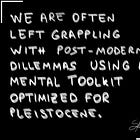Atomic Knowledge #4: Suck-Cost Fallacy
The sunk-cost fallacy is the decision to invest additional resources in a losing account, when better investments are available.
The sunk-cost fallacy is the tendency to stick with a course of action because of past investments—time, money, effort, or emotional energy—even when letting go would lead to better outcomes. Rationally, sunk costs (expenses already incurred and unrecoverable) should not influence decisions. What matters are future costs and benefits. Yet, emotions like guilt and regret, loss aversion and other behavioral glitches frequently cloud our judgment. Imagine buying a $50 concert ticket. On the day of the event, you’re sick, and the weather is awful. Rationally, staying home is the better choice. Yet, many push through the discomfort simply because the money has already been spent. This kind of flawed reasoning doesn’t stop at personal choices—it infiltrates relationships, careers, investments, and even billion-dollar projects like the Concorde airplane, where massive funds were wasted because decision-makers couldn’t walk away. The sunk cost fallacy drains resources, locks us into suboptimal paths, and distorts rational thinking. Overcoming it starts with reframing: walking away isn’t failure—it’s choosing a future unburdened by the weight of irrecoverable losses.
The Ratio: whenever I encounter an interesting concept—whether it’s a theory, speculative idea, formula, or law—I strive to deeply understand it and see how it connects within my knowledge network. Once I’ve grasped its essence, I distill it into a concise, no-frills note: simple, atomic, and memorable. To keep things sharp and focused, I stick to a “lazy” limit of 1,000 characters, give or take. These atomic notes, often described as mental models, have revolutionized how I understand and link ideas, fostering a more organic and interconnected expertise. Believing in the power of sharing, I’ve decided to make them public. Think of these notes as tools: mental models to keep in your back pocket for quick use or prompts to deepen your understanding when inspiration strikes. Subscribe if you’re curious—you won’t want to miss them.







